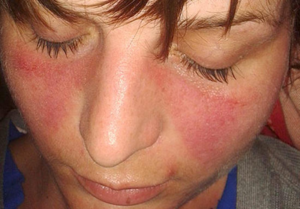Systemic Lupus Erythematosus (SLE) Serum Samples
Bay Biosciences provides high quality clinical grade serum, plasma and peripheral blood mononuclear cells (PBMC) biofluid samples derived from patients whole blood using customized clinical protocols from unique patients diagnosed with Systemic Lupus Erythematosus (SLE) disease.
Detailed clinical data and pathology annotations, including biomarkers information Sm, RNP, PCNA associated with the Systemic Lupus Erythematosus (SLE) samples is provided to a valued pharmaceutical customer for drug discovery, development and research.

Systemic Lupus Erythematosus (SLE) is a chronic autoimmune disease that causes inflammation in connective tissues, such as cartilage and the lining of blood vessels, which provide strength and flexibility to structures throughout the body.
An autoimmune disease occurs when the immune system attacks the body because it confuses it for something foreign. There are many autoimmune diseases, including Systemic Lupus Erythematosus (SLE).
Systemic lupus erythematosus (SLE) is a chronic (long-term) disease that causes systemic inflammation which affects multiple organs. In addition to affecting the skin and joints, it can affect other organs in the body such as the kidneys, the tissue lining the lungs (pleura), heart (pericardium), and brain. Many systemic lupus erythematosus (SLE) patients experience fatigue, weight loss, and fever. Lupus flares vary from mild to serious. Most patients have times when the disease is active, followed by times when the disease is mostly quiet – referred to as a remission.
According to the Lupus Foundation of America it is estimated that 1.5 million Americans, and at least five million people worldwide, have a form of lupus. Lupus strikes mostly women of childbearing age. However, men, children, and teenagers develop lupus, too. The signs and symptoms of systemic lupus erythematosus (SLE) vary among affected patients, and can involve many organs and systems, including the skin, joints, kidneys, lungs, central nervous system, and blood-forming (hematopoietic) system. Systemic lupus erythematosus (SLE) is one of a large group of conditions called autoimmune disorders that occur when the immune system attacks the body’s own tissues and organs.
Most affected systemic lupus erythematosus (SLE) patients also have joint pain, typically affecting the same joints on both sides of the body, and muscle pain and weakness, skin problems are common in SLE.
Causes of Systemic Lupus Erythematosus (SLE)
The immune system protects the body from germs and cancers. With lupus, the immune system misfires and attacks “self”, the patient’s own tissues, in a process called autoimmunity or “loss of self-tolerance”.
In systemic lupus erythematosus (SLE) as the attack goes on, all the branches of the immune system join the fight. This leads to significant and intense inflammation. The cause of systemic lupus erythematosus (SLE) is unknown, as well as what drives its diverse presentation. We know that multiple factors are required, including: the “right” genetic makeup, environmental exposures and organ specific characteristics. Patients with systemic lupus erythematosus (SLE) may also have an impaired process for clearing old and damaged cells from the body, which in turn provides continuous stimuli to the immune system and leads to abnormal immune response.
Most often, systemic lupus erythematosus (SLE) lupus starts in young females in their fertility age, although it can sometimes start during childhood. The disease is more common in some ethnic groups, mainly blacks and Asians, and tends to be worse in these groups. About 20% of people with systemic lupus erythematosus (SLE) develop the disease as children or teens. When systemic lupus erythematosus (SLE) starts in childhood, it is called childhood-onset SLE, or cSLE. It is rare to get lupus before age 5 years.
Signs and Symptoms of Systemic Lupus Erythematosus (SLE)
The signs and symptoms of systemic lupus erythematosus (SLE) varies from patient to patient and can change over time. Following are the common signs and symptoms of systemic lupus erythematosus (SLE):
- Severe Fatigue
- Joint pain
- Joint swelling
- Headaches
- Fever
- Rash on the cheeks and nose, which is called a “butterfly rash”
- Hair Loss
- Anemia
- Blood clotting
- Fingers turning white or blue and tingling when cold, which is known as Rayunaud’s phenomenon
Other symptoms depend on the part of the body the disease is attacking, such as the digestive tract, the heart or the skin. Systemic lupus erythematosus (SLE) symptoms are also symptoms of many other diseases, which makes diagnosis difficult.
Diagnosis of Systemic Lupus Erythematosus (SLE)
Systemic lupus erythematosus (SLE) can be hard to detect because it is a complex disease that has many symptoms, and they can come on slowly. As experts in diagnosing and treating autoimmune diseases such as systemic lupus erythematosus (SLE)l, rheumatologists can best determine whether a patient has Systemic lupus erythematosus (SLE) and advise them about treatment options.
Patients with Systemic lupus erythematosus (SLE) often have symptoms that are not specific to lupus. These include fever, fatigue, weight loss, blood clots and hair loss. They may also have heartburn, stomach pain and poor circulation to the fingers and toes. Pregnant women can have miscarriages. Systemic lupus erythematosus (SLE) can flare during pregnancy and can affect its outcome.
The American College of Rheumatology has a list of symptoms and other measures that can be used as a guide to decide if a patient with symptoms has Systemic lupus erythematosus (SLE).
- Rashes:
- Butterfly-shaped rash over the cheeks – referred to as malar rash
- Red rash with raised round or oval patches – known as discoid rash
- Rash on skin exposed to the sun
- Mouth sores: sores in the mouth or nose lasting from a few days to more than a month
- Arthritis: tenderness and swelling lasting for a few weeks in two or more joints
- Lung or Heart Inflammation: swelling of the tissue lining the lungs (referred to as pleurisy or pleuritis) or the heart (pericarditis), which can cause chest pain when breathing deeply
- Kidney Disease: blood or protein in the urine, or tests that suggest poor kidney function
- Neurologic Disorders: seizures, strokes or psychosis (a mental health problems)
- Abnormal blood tests such as:
- Low blood cell counts: anemia, low white blood cells, or low platelets
- Positive antinuclear antibodies (ANA) result: antibodies that can cause the body to begin attacking itself that are present in nearly all lupus patients
- Certain abnormal antibodies: anti-double-strand DNA (called anti-dsDNA), anti-Smith (referred to as anti-Sm), or antiphospholipid antibodies
If Systemic lupus erythematosus (SLE) is suspected in a patient, based on the signs and symptoms, a series of blood tests will be done in order to confirm the diagnosis. The most important blood screening test is Antinuclear antibodies (ANA). Antinuclear antibodies (ANA) are autoantibodies to the nuclei of your cells. 98% of all patients with systemic lupus have a positive ANA test, making it the most sensitive diagnostic test for confirming diagnosis of the disease.
If ANA test is negative, that means the patient doesn’t have Systemic lupus erythematosus (SLE). However, if ANA test is positive, the patient might have Systemic lupus erythematosus (SLE) and will need additional specific diagnostics tests. These blood tests include anti-double-stranded DNA antibody (anti-dsDNA), Anti-Smith antibody (anti-Sm), Anti-U1RNP antibodies, Anti-Ro/SSA and Anti-La/SSB antibodies which are specific to the diagnosis of lupus.
The presence of antiphospholipid antibodies signals a raised risk for certain complications such as miscarriage or blood clots. Doctors also may measure levels of certain complement proteins (a part of the immune system) in the blood, to help detect the disease and follow its progress.

Bay Biosciences is a global leader in providing researchers with high quality, clinical grade, fully characterized human tissue samples, bio-specimens and human bio-fluid collections from cancer (tumor) tissue, cancer serum, cancer plasma cancer PBMC and human tissue samples from most other therapeutic areas and diseases.
Bay Biosciences maintains and manages it’s own bio-repository, human tissue bank (biobank) consisting of thousands of diseased samples (specimens) and from normal healthy donors available in all formats and types. Our biobank procures and stores fully consented, deidentified and institutional review boards (IRB) approved human tissue samples and matched controls.
All our human human tissue collections, human specimens and human bio-fluids are provided with detailed samples associated patient’s clinical data. This critical patient’s clinical data includes information relating to their past and current disease, treatment history, lifestyle choices, biomarkers and genetic information. Patient’s data is extremely valuable for researchers and is used to help identify new effective treatments (drug discovery & development) in oncology, other therapeutic areas and diseases. This clinical information is critical to demonstrate their impact, monitor the safety of medicines, testing & diagnostics, and generate new knowledge about the causes of disease and illness.
Bay Biosciences banks wide variety of human tissue samples and biological samples including cryogenically preserved -80°C, fresh, fresh frozen tissue samples, tumor tissue samples, FFPE’s, tissue slides, with matching human bio-fluids, whole blood and blood derived products such as serum, plasma and PBMC’s.
Bay Biosciences is a global leader in collecting and providing human tissue samples according to the researchers specified requirements and customized, tailor made collection protocols. Please contact us anytime to discuss your special research projects and customized human tissue sample requirements.
Bay Biosciences provides human tissue samples (human specimens) from diseased and normal healthy donors; including peripheral whole-blood, amniotic fluid, bronchoalveolar lavage fluid (BAL), sputum, pleural effusion, cerebrospinal fluid (CSF), serum (sera), plasma, peripheral blood mononuclear cells (PBMC’s), saliva, Buffy coat, urine, stool samples, aqueous humor, vitreous humor, kidney stones, renal calculi, nephrolithiasis, urolithiasis and other bodily fluids from most diseases including cancer. We can also procure most human bio-specimens and can do special collections and requests of human samples that are difficult to find. All our human tissue samples are procured through IRB approved clinical protocols and procedures.
In addition to the standard processing protocols Bay Biosciences can also provide human plasma, serum, PBMC bio-fluid samples using custom processing protocols, you can buy donor specific sample collections in higher volumes and specified sample aliquoting from us. Bay Biosciences also provides human samples from normal healthy donors, volunteers, for controls and clinical research, contact us Now.
日本のお客様は、ベイバイオサイエンスジャパンBay Biosciences Japanまたはhttp://baybiosciences-jp.com/contact/までご連絡ください。


